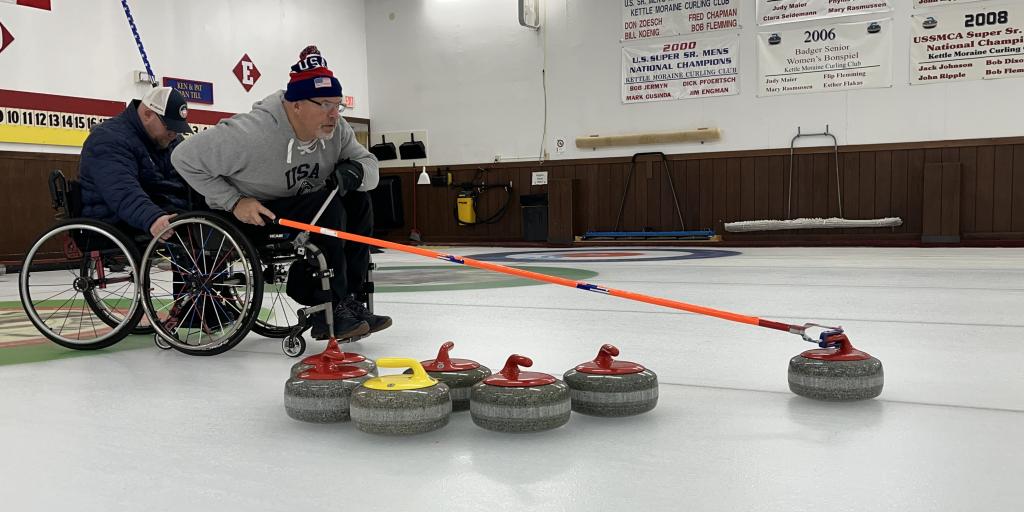Steve Emt - U.S. Army

Two life-changing experiences have shaped Steve Emt’s journey: a devastating car accident that left him paralyzed, and the discovery of a sport that reignited his competitive spirit — curling. Remarkably, it was the first event that led him to the second, opening the door to a new passion and purpose.
We’re honored to share our Q&A with Army Veteran and 2-time USA Wheelchair Curling National Champion Steve Emt, as he reflects on his path into adaptive curling and his role with USA Curling.
Q: Can you share your journey into adaptive curling and how you became involved with USA Curling?
A: In the summer of 2014, I was visiting Cape Cod, MA, when I was approached by a gentleman. He asked me, "Excuse me...are you local?" To which I replied, "No, I am not...I'm from CT, about 2.5 hours away." There was some confusion, so I finally asked him why he asked that question. His response "I train with the Paralympic Curling Team here on the Cape and I saw you pushing up the hill back there. With your build...I can make you into a Paralympian within a year!" To which I responded..."I'm in...but what the hell is curling???" So, I literally got stalked into this sport. That gentleman's name was Tony, and he was one of the coaches. He's a HUGE mentor of mine. I tried the sport 2 weeks later and absolutely fell in love with it!
Q: How does adaptive curling differ from traditional curling, and what unique challenges does it present?
A: There are 2 main differences between adaptive and able body curling. With adaptive, we deliver the stone from a stationary position instead of sliding out of the hack and the other major difference is that we don't sweep. There aren't really any more unique challenges with my sport than what adaptive athletes deal with within our daily lives.
Q: Congratulations on your recent win! Can you walk us through the key moments of the competition?
A: My teammate Laura Dwyer and I won the Mixed Doubles National Championship in January. It was a great weekend where we both played well. In the finals, we came up against last year's National Champions, so it was a challenge from the very start. Fortunately, we got off to a great start, scoring 5 in the first end, and then played well the rest of the way to secure the victory. National Champions!!!
Q: How did you and your team prepare for this competition, both mentally and physically?
A: Laura and I, since we only live 45 minutes apart here in Wisconsin, usually train together 2-3 times per week so getting ready for this competition was no different. We were very fortunate to work with members of both of our local clubs to put together games and training sessions to get better. Mentally...USA Curling does a tremendous job of supporting its athletes with all kinds of resources, including a Sports Psychologist who we met with both individually and as a team at least once a week.
Q: Were there any unexpected challenges or surprises during the event?
A: Yes! The night before the finals, Laura fell to an injury that kept her up most of the night. But she battled through it during the finals and we came out victorious.
Q: What role does teamwork play in adaptive curling, and how do you foster strong team dynamics?
A: Teamwork is HUGE. Although it comes down to me doing my job and making the shot that is called...I need to rely on my teammates to relay information to me such as how the ice is "feeling", how much curl it may have that day, how fast or slow it actually is. There's no way we can be successful without incredible teamwork. Strong team dynamics come with time. Laura and I, as well as the rest of Team USA have been playing together for many years so we are very familiar with each other.
Q: Can you describe a memorable moment or achievement in your adaptive curling career?
A: One specific shot that comes to mind is one that I made in the 2023 World Championships in Canada, where I made a perfect shot late in the game to win it. That shot I will never forget. But...any time I get the chance to put on a jersey with my last name, the American flag, and the letters USA on the back of it is very memorable to me! I will NEVER take that for granted.
Q: How has adaptive curling impacted your life, both on and off the ice?
This sport has changed my life. I'm not going to say that it has saved my life, although I've met many adaptive curlers who might say that, but it definitely changed my life. It has made me a better person, man, on and off the ice because it has taught me to relax, take my time, slow down, concentrate, and appreciate everything. Tony was big with that. Any time we would train together and he'd watch me compete, if I didn't do well I'd come off the ice ready to break something! And there he was...with his arms wide open looking for a hug. He calmed me down. This sport calmed me down. Damn Tony!!!
Q: What advice would you give to someone who is new to adaptive curling and looking to get started?
A: I can't tell you about it, you can't watch me...let me get you on the ice and show you and I'll get you hooked. Overall, it's just like any other advice to a person looking to get involved in something...DO IT! Get off the couch and get out there and do it. Life is way too short and the more we can do to be active in our every day lives will make our quality of life that much better!


